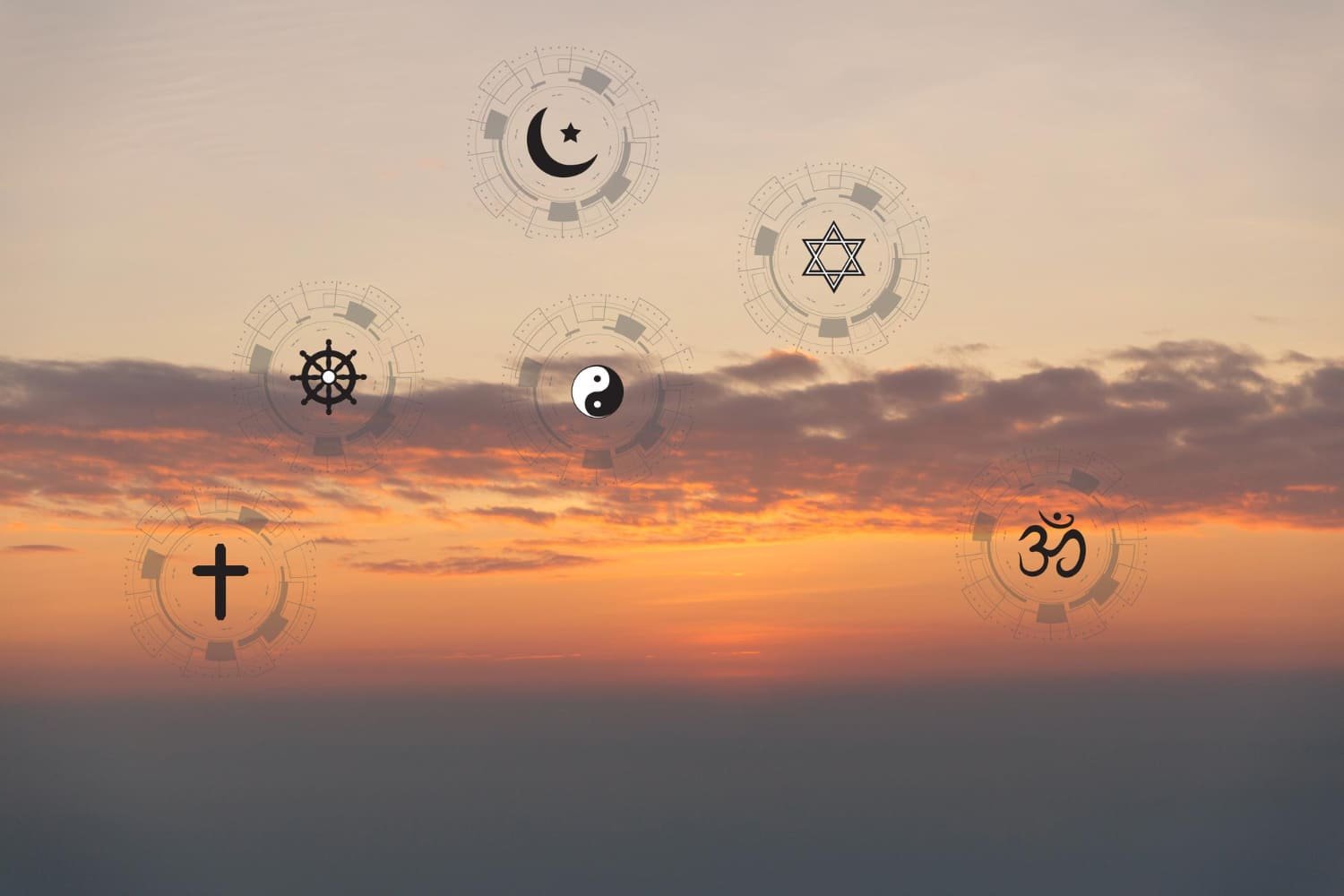Judaism and Hinduism are two of the oldest and most significant religions in the world. While they may share some similarities, they are vastly different in terms of their beliefs, practices, and values.
This article aims to explore the differences between Judaism and Hinduism and provide insight into which one is better.
One of the most significant differences between Judaism and Hinduism is their approach to God. Judaism is a monotheistic religion, meaning that it believes in one God who is transcendent and separate from the world.
In contrast, Hinduism is a polytheistic religion, meaning that it believes in many gods and goddesses who are both immanent and transcendent. This fundamental difference in belief shapes the way that followers of each religion worship and interact with their deity.
Another major difference between Judaism and Hinduism is their religious scriptures. Judaism primarily follows the Tanakh and Torah, which are considered the holy books of the religion.
In contrast, Hinduism has numerous religious scriptures, including the Vedas, the Upanishads, and the Bhagavad Gita, among others. Each of these texts provides guidance and insight into the religion’s beliefs and practices, making them central to the religion’s identity and traditions.
Origins and History
Judaism and Hinduism are two of the oldest religions in the world, but they have very different origins and histories. Judaism is believed to have originated in the Middle East thousands of years ago, with the Hebrew people and the belief in one God.
The Hebrew Bible, or Tanakh, is the primary religious text of Judaism and contains the history, laws, and teachings of the Jewish people.
Hinduism, on the other hand, has a more complex origin story. It is believed to have originated in the Indus Valley civilization around 4000 years ago. Unlike Judaism, Hinduism does not have a single founder or religious text.
Instead, it is a collection of diverse beliefs, practices, and traditions that have evolved over time.
Both religions have faced persecution and oppression throughout history. Judaism has a long history of persecution, including the Holocaust during World War II. Hinduism has also faced persecution, particularly during the Mughal Empire in India and the British colonization of India.
Beliefs and Practices
Judaism and Hinduism are two vastly different religions with distinct beliefs and practices. Judaism is a monotheistic religion that believes in one God who revealed himself to Abraham, Moses, and the Hebrew prophets. The central text of Judaism is the Torah, which contains the commandments and teachings of God.
Jews believe in the importance of following these commandments, which include observing the Sabbath, keeping kosher, and performing acts of charity.
Hinduism, on the other hand, is a polytheistic religion that believes in many gods and goddesses. The central text of Hinduism is the Vedas, which contain hymns, rituals, and philosophical discussions.
Hindus believe in the concept of karma, which means that actions in this life will affect one’s future lives. They also believe in the idea of reincarnation, where the soul is reborn after death into a new body.
Both religions have their own unique practices and rituals. In Judaism, prayer is an important part of daily life, and the synagogue is the center of Jewish worship. Jews also celebrate holidays such as Passover, Yom Kippur, and Hanukkah.
In Hinduism, worship takes place in temples and at home altars, and rituals include puja (worship) and offerings to the gods. Hindus also celebrate festivals such as Diwali and Holi.
Overall, while both religions have their own distinct beliefs and practices, it is difficult to say which one is better as it ultimately comes down to personal belief and preference.
Scriptures and Texts
Both Hinduism and Judaism have a rich collection of scriptures and texts that guide their followers’ beliefs and practices. In Hinduism, the most important texts are the Vedas, Upanishads, Bhagavad Gita, and Puranas.
These texts contain hymns, prayers, and philosophical teachings that provide guidance on how to live a virtuous life and achieve spiritual liberation. The Bhagavad Gita, in particular, is a revered text that is often cited as the most important Hindu scripture.
On the other hand, Judaism’s most important texts are the Torah, Talmud, and Midrash. The Torah contains the first five books of the Hebrew Bible and is considered the most sacred text in Judaism.
It contains the laws and commandments that Jews are expected to follow, as well as stories of Jewish history and tradition. The Talmud is a collection of Jewish law and tradition, while the Midrash contains stories and commentaries on the Hebrew Bible.
While both religions place great importance on their respective texts, there are some notable differences between them. For example, Hinduism’s texts are much older than Judaism’s, with the Vedas dating back to around 1500 BCE.
Additionally, Hinduism’s texts are more philosophical in nature, with a focus on spiritual liberation and the nature of reality. In contrast, Judaism’s texts are more focused on law and tradition, with a strong emphasis on the covenant between God and the Jewish people.
| Hinduism | Judaism |
|---|---|
| Contains the Vedas, Upanishads, Bhagavad Gita, and Puranas | Contains the Torah, Talmud, and Midrash |
| Focuses on spiritual liberation and the nature of reality | Focuses on law and tradition, with a strong emphasis on the covenant between God and the Jewish people |
| Texts are much older, with the Vedas dating back to around 1500 BCE | Texts are more recent, with the Torah dating back to around 1200 BCE |
Overall, while both religions have their own unique texts and teachings, it is important to remember that they both share a common goal of achieving a closer relationship with the divine. Whether one is better than the other ultimately depends on individual beliefs and perspectives.
Deities and Worship
One of the most significant differences between Judaism and Hinduism is their beliefs about deities and worship. In Judaism, there is only one God, who is transcendent and omnipotent.
Jews believe that God created the universe and everything in it, and they worship Him through prayer, study of the Torah, and performing good deeds.
On the other hand, Hinduism is a polytheistic religion, which means that it worships multiple gods and goddesses. Different Hindu sects have different beliefs about the nature and identity of God, with some believing in monotheism, polytheism, pantheism, and panentheism.
The most commonly worshipped gods in Hinduism are Brahma, Vishnu, and Shiva, who are known as the Trimurti.
Another significant difference between the two religions is the way they worship their deities. In Judaism, worship is centered around the synagogue, where Jews gather to pray, study, and celebrate holidays. They do not have images or statues of God in their places of worship, as it is forbidden in the Jewish faith.
On the other hand, Hinduism has a rich tradition of idol worship, where devotees offer prayers and offerings to statues and images of their gods and goddesses. Hindu temples are ornately decorated with colorful paintings and sculptures, and they are considered to be the abode of the deities.
Overall, the differences between Judaism and Hinduism in their beliefs about deities and worship are significant.
While Judaism is monotheistic and focuses on the worship of one God, Hinduism is polytheistic and has a rich tradition of idol worship.
Comparison of Major Tenets
Judaism and Hinduism are two of the oldest religions in the world, with different beliefs and practices. Here is a comparison of some of the major tenets of the two religions:
God In Judaism, God is considered to be a single, all-knowing, and all-powerful entity who created the universe and continues to oversee it. In contrast, Hinduism has a diverse set of beliefs about God, with some sects believing in monotheism, polytheism, pantheism, and panentheism.
Scriptures Judaism’s main religious text is the Torah, which contains the first five books of the Hebrew Bible. Hinduism has a vast collection of scriptures, including the Vedas, Upanishads, and Bhagavad Gita.
Beliefs about Life Judaism believes that life is a gift from God and that humans have a responsibility to live a moral and ethical life. Hinduism believes in the concept of karma, which means that one’s actions in this life will determine their fate in the next life.
Afterlife Judaism believes in an afterlife, where the soul goes to either heaven or hell, depending on their actions in life. Hinduism believes in reincarnation, where the soul is reborn into a new body after death, based on their karma.
Worship Judaism emphasizes the importance of prayer and worship in a synagogue, led by a rabbi. Hinduism has a diverse set of practices, including puja (worship of deities), meditation, and yoga.
Food Judaism has strict dietary laws, with certain foods being considered kosher (permissible) and others being considered treif (forbidden). Hinduism has no strict dietary laws but many Hindus are vegetarians due to their belief in ahimsa (non-violence).
Overall, while both religions have some similarities, they have many differences in their beliefs and practices. It is up to the individual to determine which religion is better suited to their beliefs and values.
Social and Cultural Influence
Both Hinduism and Judaism have had a significant impact on the social and cultural development of their respective regions.
In Hinduism, the caste system has had a profound influence on Indian society. The caste system divides people into different social classes based on their birth, occupation, and economic status. This system has been a source of controversy and criticism, as it has been used to justify discrimination and inequality.
Judaism, on the other hand, has had a significant impact on Western culture and civilization. It has influenced the development of ethics, law, and philosophy. The Jewish people have also faced discrimination and persecution throughout history, including during the Holocaust.
Both religions have unique cultural practices and traditions. Hinduism has a rich tradition of festivals and celebrations, such as Diwali and Holi, which are celebrated with great enthusiasm and fervor. Judaism has its own set of festivals and traditions, such as Hanukkah and Passover, which are celebrated with equal zeal and enthusiasm.
Overall, both religions have had a profound impact on the social and cultural development of their respective regions. While they have faced their own unique challenges and controversies, they continue to play an important role in shaping the cultural fabric of their societies.
Conclusion
In conclusion, Judaism and Hinduism are two distinct religions that have their own unique beliefs, practices, and cultural traditions.
While both religions have similarities in their emphasis on ethical behavior and the importance of community, they differ in their beliefs about the nature of God, the afterlife, and the concept of salvation.
Judaism is a monotheistic religion that emphasizes the importance of following the commandments of God as outlined in the Torah.
It places a strong emphasis on the concept of justice and righteousness, and the idea that every individual has a responsibility to contribute to the betterment of society.
Hinduism, on the other hand, is a polytheistic religion that emphasizes the importance of personal spiritual growth and the attainment of self-realization. It places a strong emphasis on the concepts of karma, reincarnation, and the attainment of moksha.
While it is impossible to say which religion is “better” as both have their own unique strengths and weaknesses, it is clear that both religions have played a significant role in shaping the cultural and spiritual traditions of their respective communities.
Whether one chooses to follow the teachings of Judaism or Hinduism, it is important to approach these religions with an open mind and a willingness to learn and grow.







